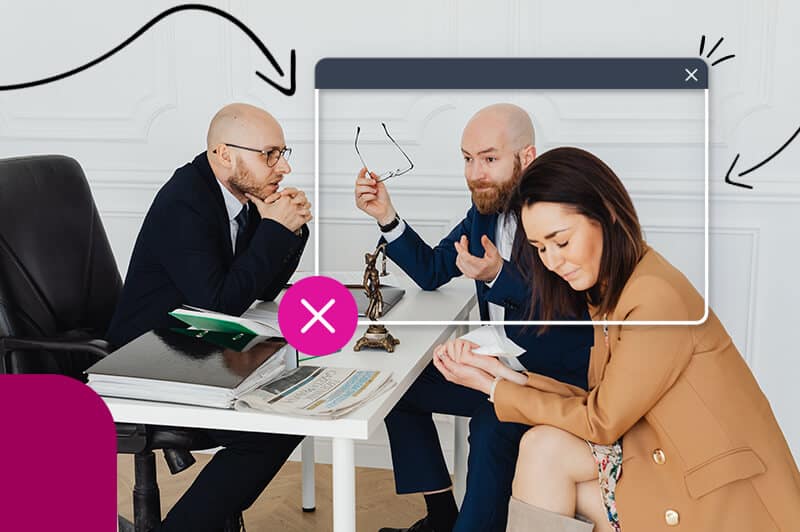You’ve launched your business, and eyes are on it. Everyone wants a piece of what you offer. But there’s one thing stopping your audience from purchasing your product or service. And it’s that they can’t afford it.
Eek! As a business owner myself, hearing the words, “I can’t afford it” come out of a customer’s mouth stings my heart (and my business).
But here’s the thing; I’ve used this line before myself. Was it entirely true? No, I lied. I either thought the product was too expensive or I didn’t think it could solve my problem. Basically, I used this line to get out of an awkward situation.
And there’s a chance your customers are doing the same thing. But there’s a way to handle this situation so that you take away something from the experience, regardless if it’s a sale or not.
In this article, I’m going to talk about the things you should and shouldn’t do when a customer says they’re interested in your business but can’t afford you.
The Truth: Why People Say They Can’t Afford You

People are not going to necessarily tell you the real reason why they can’t afford you. In all honesty, they probably can afford you.
But knowing why they say they can’t afford you can help you improve branding and reduce the chances of this happening again.
Low perceived value
Does your customer see the value in your product or service? I’ve spent hundreds of dollars on products that, in all honesty, weren’t worth the price. But I bought those products because I thought they had value.
See, value is subjective. And your goal as a business owner is to help the customer see the value in your business.
Let’s be honest, is a $1,500 iPhone better than a $500 Android? Probably not, but people believe it is, and they’re willing to pay more for it. In other words, they see the value in the product, and when that happens, they will pay for it.
Lack of trust
Your product or service being overpriced is usually an excuse. There’s always another reason.
“Too expensive” can mean they don’t see the value in your business, but it can also mean they don’t trust your business.
For example, do you have a weak social media presence? Do you send one too many newsletters? This is why it’s important to work on building relationships with your audience – it builds trust.
Wrong audience
Do you know who your audience is? Have you conducted audience research and created an audience persona?
If you’re scratching your head at these questions, stop what you’re doing and do this first. I’m saying this because knowing your audience is essential for a successful business. And not knowing your audience is usually the root problem of many issues within your business.
Think about it. People who like eating Chinese food go to a Chinese restaurant. Someone who likes fitness will go to the gym. Women getting married hire a wedding planner.
The above examples all have different audiences with different needs. Your audience is specific, and you need to know how to speak to them.
Not a priority
Remember the movie, He’s Just Not That Into You? The entire movie basically showed that if a guy is really into you, he’ll show it.
Someone may like your product or service, but not enough to buy it. It’s just not a priority for them, and you haven’t convinced them otherwise.
4 Don’ts When a Customer Says You’re Too Expensive

So, let’s get into a real-life scenario. You’re talking to your customer, and they say that your product or service is too expensive. What do you do?
Well, here are 4 things you should not do:
- Reduce your price;
- Try to convince the customer;
- Negotiate the price;
- Justify the price
Doing any of the above puts the power in the customer’s hands. You’ve done the hard work, you have a business plan, and you know your expenses.
While your customer has a different idea of what they feel they should pay, the reality is this is your business, and the price is your price.
However, like I talked about earlier, the price is usually not the issue. Knowing how to respond to your customer can help you make a sale and gain understanding of the real reasons why customers are hesitant to invest in your business.
For example, it could be they don’t trust your product. In that case, as a business owner, you need to work on increasing brand loyalty. You can do this by increasing social media engagement, improving your customer services, etc.
7 Things to Do When a Customer Says They Can’t Afford You

Knowing what to do when a customer says they can’t afford you can not only make a sale but help you improve your business.
So, let’s talk about things you should do.
Show empathy
Before anything, your customer wants to feel understood and heard. So, show empathy. No one wants to feel like the only thing they’re good for is a dollar bill.
Instead of pressuring them, step back and say something like, “Thank you for sharing how you feel. I understand how it feels to be interested in a product or service you really like but feel you can’t afford it.”
By showing empathy, you reduce the pressure off your customer and start to build trust. Now, you can work on showing different ways they can get your service or product at the given price.
Ask questions
At this point, you don’t know why they don’t want to invest in your business. All you know is that in their eyes, your product or service is too expensive.
This is when you start to ask questions to get to the root issue (remember, it’s usually not about the money). It’s time to become a detective.
Here are some questions you can ask:
- If money wasn’t an issue, would you invest in this product/service?
- Do you feel this product/service would help you reach your goals?
- What would be needed for you to invest in this product/service?
By asking these questions, you’ll gain insight into the real reason.
Whether they choose to invest in your business or not, you’ll have the information needed to improve your business. For example, if the customer says they wouldn’t invest in your product/service if money wasn’t an issue, they don’t see the value in your product.
From there, you’ll need to work on improving your brand’s image.
Work in phases
Let’s say you have a business making handmade rugs. A customer approaches you and wants 5 rugs made but doesn’t have the money for all five.
Why not work in phases? So, instead of making all five rugs, you do one-by-one, and the customer pays after each rug is completed.
That way, you don’t financially choke the customer and still get paid the price you offered.
Offer them a payment plan
Whether it’s a product or service, sometimes people genuinely cannot afford to pay one lump sum. So, give them options. Offer them a payment plan. It could be monthly payments or ask for 50% upfront and 50% after a certain amount of time.
If they want the product or service, they’ll work with you to create a payment plan that suits them.
Ask their budget
If you’re selling a product, this isn’t applicable to you. However, if you’re selling a service, then keep reading.
Let’s say you’re a graphic designer and someone is looking for illustrations for their homepage. If you want, ask about their budget and show them what you can provide them within their budget. Or provide them an estimate for the entire homepage.
They will either do one of two things 1) choose you, or 2) try to find a cheaper option. Either way, you give them the information they need to make that decision.
Know when to walk away
You can’t convince everyone to invest in your business. You need to know when to walk away.
If they cannot manage to overcome the core issues of investing in your business, there’s not much you can do.
Instead, understand you’re not going to win over every customer and focus on the customers who are willing to invest in your business. Let it go, let it go…
Over to You
As a business owner, nothing stings more than having customers reject your business. But instead of seeing it as a loss, see it as an opportunity for growth.
The next time a customer says they can’t afford your business, do the steps suggested above. Either way, you’ll land a sale or learn valuable information about your brand and how to improve it.
